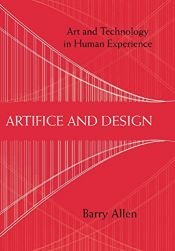Artifice and Design: Art and Technology in Human Experience
Blurb
"As familiar and widely appreciated works of modern technology, bridges are a good place to study the relationship between the aesthetic and the technical. Fully engaged technical design is at once aesthetic and structural. In the best work (the best design, the most well made), the look and feel of a device (its aesthetic, perceptual interface) is as important a part of the design problem as its mechanism (the interface of parts and systems). We have no idea how to make something that is merely efficient, a rational instrument blindly indifferent to how it appears. No engineer can design such a thing and none has ever been built."―from Artifice and Design
In an intriguing book about the aesthetics of technological objects and the relationship between technical and artistic accomplishment, Barry Allen develops the philosophical implications of a series of interrelated concepts―knowledge, artifact, design, tool, art, and technology―and uses them to explore parallel questions about artistry in technology and technics in art. This may be seen at the heart of Artifice and Design in Allen's discussion of seven bridges: he focuses at length on two New York bridges―the Hell Gate Bridge and the Bayonne Bridge―and makes use of original sources for insight into the designers' ideas about the aesthetic dimensions of their work. Allen starts from the conviction that art and technology must be treated together, as two aspects of a common, technical human nature.
The topics covered in Artifice and Design are wide-ranging and interdisciplinary, drawing from evolutionary biology, cognitive psychology, and the history and anthropology of art and technology. The book concludes that it is a mistake to think of art as something subjective, or as an arbitrary social representation, and of Technology as an instrumental form of purposive rationality. "By segregating art and technology," Allen writes, "we divide ourselves against ourselves, casting up self-made obstacles to the ingenuity of art and technology."

 English
English Español
Español Deutsch
Deutsch










Member Reviews Write your own review
Be the first person to review
Log in to comment